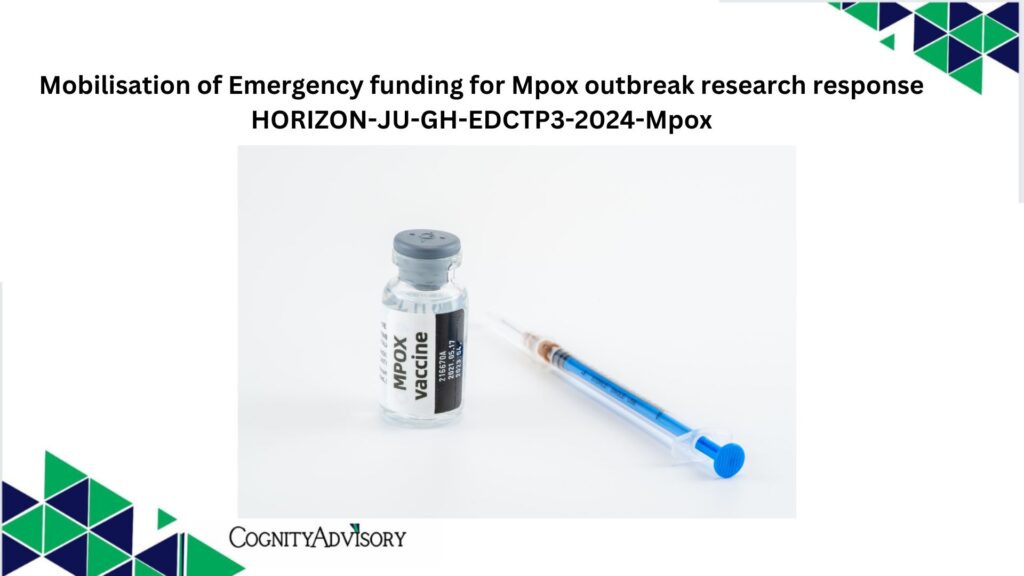HORIZON-JU-GH-EDCTP3-2024-Mpox
General information
Programme
Horizon Europe Framework Programme (HORIZON)Budget overview
Call
Type of action
HORIZON-JU-RIA HORIZON JU Research and Innovation Actions
Type of MGA
HORIZON Action Grant Budget-Based [HORIZON-AG]
Forthcoming
Deadline model
single-stage
Planned opening date
14 May 2024
Deadline date
29 May 2024 17:00:00 Brussels timeTopic description
ExpectedOutcome:
This topic aims at supporting activities that contribute to answering the most pressing questions raised by public health responders to the Mpox Public Health Emergency (PHE), as part of the efforts to manage and prevent the spread of the current epidemic. Proposals should result in new knowledge to manage and prevent future outbreaks and should strengthen the capacities of at-risk countries to respond to epidemics.
To that end, proposals submitted under this topic should aim at delivering results that are contributing to the following expected outcomes:
- Provide novel, critical and timely insights into the Mpox outbreak and/or potential avenues for its management or prevention, focusing on the most affected population, specifically children, pregnant women and immunosuppressed individuals.
- Be timely, with rapid activation, to enable early and valuable outcomes and results to be produced and/or to support access time-dependent resources.
- To contribute to the public health preparedness and response in the context of the ongoing Mpox epidemic.
Scope:
The Global Health EDCTP3 Work Programme 2024 [1] foresees funding to be mobilised in case of a Public Health Emergency (PHE). This mechanism allows rapid mobilisation of research funding with or without a call for proposals in exceptional and duly substantiated emergencies. Global Health EDCTP3 considers a situation as an emergency if it is unforeseen and presents a serious and immediate risk to human health.
Following the Mpox outbreak in the Democratic Republic of Congo (DRC), first reported in 2023, the DRC Government, Africa CDC, World Health Organization (WHO) and partners have been closely monitoring it. From 1 January through 12 November 2023, a total of 12 569 suspected Mpox cases, including 581 suspected Mpox deaths (case fatality ratio: 4.6%), had been reported in 156 health zones from 22 out of 26 (85%) provinces of the DRC [2]. In 2024, and as of 29 March, 4 488 cases have been reported, of which 319 have been confirmed. A total of 279 deaths have been reported in the country in 2024 (CFR: 6.7%)[3].
On 13 April 2024, a High-Level Emergency Regional Meeting [4] was held in Kinshasa, to discuss the ongoing epidemic of Mpox in DRC and the potential risk of transmission to neighbouring countries and beyond. On the same day, the Ministry of Health (MoH) of DRC assessed the situation and considered the ongoing outbreak as a Public Health Emergency which requires a rapid and efficacious response. Aligning with this statement, the High-Level Meeting ended with a Communiqué (dated 13 April 2024) whereby twelve Ministers of Health and international partners called for a coordinated response to the outbreak and for the establishment of an Africa Taskforce for Mpox Coordination among Member States affected and at-risk of Mpox. These documents include a call to accelerate research and regulatory processes to enable access to vaccines, diagnostics and therapeutics for affected populations including children.
In the light of rising numbers of cases being reported in the DRC and the high public health risk, the Global Health EDCTP3 is activating the emergency funding mechanism to support research and innovation projects and activities as part of the Joint Undertaking’s response to the emergency.
The Global Health EDCTP3 invites proposals for Research & Innovation Actions (RIA) to support research activities in DRC and neighbouring or affected countries, to manage and/or prevent the spread of the current Mpox outbreak.
Proposals should address one or more of the following areas:
- Vaccines research and development:Trials should focus on both pre-exposure prophylaxis and post-exposure prophylaxis.
- Clinical trials for therapeutics:Proposals should include trials on therapeutic products in the context of the Monitored Emergency Use of Unregistered Interventions (MEURI), such as tecovirimat (approved by the European Medicines Agency for use in the European Union) and other promising therapeutic candidates. Research on pain management strategies should integrated in the proposed R&D efforts.
- Surveillance strategies, evaluation of rapid diagnostics and epidemiological studies:Proposals should provide data on epidemiological characteristics such as geographical spread, viral genotype, and pathogenicity, clinical information on host susceptibility and host immune responses. This work is foreseen to use and evaluate available diagnostic tools to ensure improved surveillance.
Moreover, proposals should ensure:
- Focus on the most affected population, specifically children, pregnant women and immunosuppressed individuals.
- Alignment with the national priorities of the DRC and neighbouring countries as well as the African Taskforce for Mpox Coordination.
- Partnership with researchers and public health institutions in DRC and neighbouring countries.
- Strengthening of national and local research capacity.
- Coordination and collaboration with other research and/or humanitarian activities operational in the countries affected.
- Alignment with the Africa CDC Task Force recommendations for rapid activation of R&D activities to control the outbreak.
- Compliance with International Council on Harmonisation – Good Clinical Practice (ICH-GCP), regulatory and ethical standards.
- Commitment to open access and data sharing principles, including appropriate data management and governance plans.
- Demonstrate alignment/synergy with DRC national government health service delivery policy and plans, where appropriate.
Proposals should provide novel, critical and timely insights into the Mpox outbreak and/or potential avenues for its management or prevention, focusing on the most affected population, specifically children, pregnant women and immunosuppressed individuals.
Proposals must be timely, with rapid activation, to enable early and valuable outcomes to be established and/or to access time-dependent resources.
Proposals funded under this mechanism must share the relevant generated data within 30 days after generation with all parties that need and can use the findings to address the PHE.
